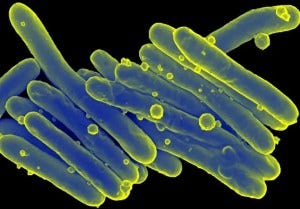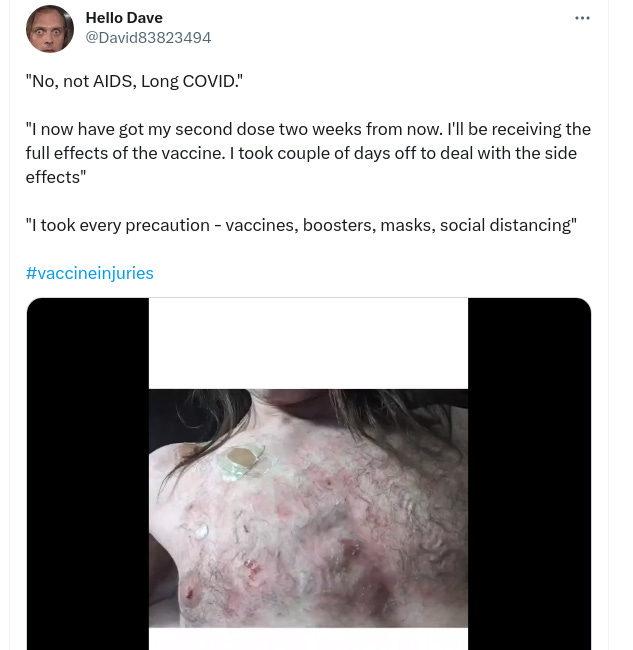FRIGHTENING: Leprosy Following COVID-19 Vaccination
Leprosy adverse events associated with BNT162b2 anti-SARS-CoV-2 vaccine (two case reports)
One-time or recurring donations can be made through Ko-Fi:
mRNA Nanoparticle Biooweapon aka “anti-SARS-CoV-2 vaccine” strikes again.
A study conducted to examine the anti-SARS-CoV-2 vaccination status of individuals who were diagnosed with leprosy revealed “a very high rate of anti-SARS-CoV-2 vaccination among individuals attending the Leprosy Clinic. 49 individuals (98%) were vaccinated.”
Leprosy adverse events associated with BNT162b2 anti-SARS-CoV-2 vaccine (two case reports)
Aug 7, 2023 | Long COVID and Other Body Systems
The authors from the United Kingdom conducted a retrospective cohort study to examine the anti-SARS-CoV-2 vaccination status of individuals who were diagnosed with leprosy and attended in 2021 the Leprosy Clinic at the Hospital for Tropical Diseases, London, UK, a national referral center in the UK for tropical and infectious diseases. They also examined whether any of these individuals had developed leprosy or experienced a new leprosy reaction within the 12 weeks following the anri-SARS-CoV-2 vaccination. They presented two cases who met the criteria for a new leprosy adverse events associated with BNT162b2 anti-SARS-CoV-2 vaccine.
Since 1954, there have been no reports of an individual acquiring leprosy in the UK. However, individuals who have migrated from or lived for extended period in countries with endemic leprosy continue to be diagnosed.
Leprosy is a caused by Mycobacterium leprae. The clinical presentation depends on the immune response of the affected person. Tuberculoid and borderline tuberculoid leprosy is characterized by Th1 type immune response with granuloma formation in the presence of CD4+ T cells and few or no bacteria identifiable in tissues. A high bacterial load, poor granuloma formation and a predominance of CD8+ T cells are characteristics of lepromatous leprosy.
The individuals diagnosed with leprosy can have immune-mediated complications known as leprosy reactions. There are two types of leprosy reactions. The characteristics of Type 1 reaction are the development of edema, inflammation in existing leprosy skin lesions and nerves, pain and loss of function. Type 1 reaction is a delayed hypersensitivity reaction toantigens of Mycobacterium leprae. Erythema Nodosum Leprosum or Type 2 Reaction is a multisystem complication characterized by painful cutaneous nodules, fever, arthralgia, arthritis, and neuritis.
About the study
The authors conducted a retrospective cohort study to examine the anti-SARS-CoV-2 vaccination status of individuals who were diagnosed with leprosy and attended in 2021the Leprosy Clinic. They also examined whether any of these individuals had developed leprosy or experienced a new leprosy reaction within the 12 weeks following the anti-SARS-CoV-2 vaccine. The electronic patient records were used to obtain data.
A leprosy associated adverse event was defined as the onset of leprosy or a leprosy reaction, and/or neuritis, within 12 weeks following the administration of a dose of anti-SARS-CoV-2 vaccine in an individual with no previous history of leprosy or a leprosy reaction and/or neuritis and who had not received treatment for a leprosy reaction and/or neuritis within the previous 12 weeks.
In the year 2021, 52 individuals with leprosy attended the clinic, of which 5 individuals were newly diagnosed with leprosy. 37 individuals (71%) were male, the median age was 48.5 years (range 27–85 years).
23 individuals (44.2%) were diagnosed with lepromatous leprosy, nine (17.3%) with borderline lepromatous leprosy, one (1.9%) with borderline leprosy, 14 (26.9%) with borderline tuberculoid leprosy and one (1.9%) with turberculoid leprosy. Two individuals (3.8%) were diagnosed with pure neural leprosy.
In the year 2021, 21 of 52 individuals (40.3%) were prescribed a systemic immunosuppressant therapy for leprosy reactions. 10 individuals (19.2%) had another risk factor for severe COVID-19, including one patient with HIV coinfection.
The findings revealed a very high rate of anti-SARS-CoV-2 vaccination among individuals attending the Leprosy Clinic. 49 individuals (98%) were vaccinated. One individual had declined vaccination.
The cases
Two individuals met the criteria for a new leprosy adverse events associated with BNT162b2 anti-SARS-CoV-2 vaccine.
Case 1
One week after a second dose of BNT162b2 vaccine, an 80-year-old man, who lived in the UK for 49 years, was diagnosed with borderline tuberculoid leprosy. A disease was manifested with red skin lesions, reduced sensation and thickened peripheral nerves. The diagnosis was confirmed by skin biopsy showing peri-neural and peri-adnexal granulomatous inflammation with infiltration and destruction of dermal nerves. The Wade-Fite stain was negative. Slit-skin smear was negative.
Anti-microbial therapy improved the skin lesions and nerve thickening within eight weeks. There had been no recurrence of the plaques or nerve signs after 12 months.
Case 2
A 27-year-old man developed red plaques and tender thickened nerves consistent with a leprosy Type 1 reaction 56 days after receiving a single dose of BNT162b2 vaccine (following the administration of two doses of CoronaVac vaccine three months earlier). A skin biopsy supported the diagnosis, showing non-necrotising destructive granulomatous neuritis, edema and epidermal HLA-DR upregulation consistent with a Type 1 reaction. The skin lesions and tender nerves improved with a reducing course of prednisolone and had not recurred after 12 months.
The authors pointed out that they have identified 14 individuals with leprosy adverse events associated with anti-SARS-CoV-2 vaccines in 6 published articles from both leprosy endemic and non-endemic settings. Ten of the 14 individuals experienced a leprosy adverse events after the first vaccination, three after the second and one after the third vaccine.
This article was published in PLOS Neglected Tropical Diseases
de Barros B et al. (2023) COVID-19 vaccination and leprosy–A UK hospital-based retrospective cohort study. PLoS Negl Trop Dis 17(8): e0011493. August 4, 2023 (Open Access) https://doi.org/10.1371/journal.pntd.0011493
Source: discovermednews.com
Related articles:
FRIGHTENING: Psychosis Following COVID-19 Vaccination
Transhumanism, Nanotechnology, and Cybernetics
SHOCKING - Here is What Really is in the Vaccines
SECRET HISTORY: Military Spraying the Flu, RULE 23 and BIO WARFARE on Citizens
Dr.Sucharit Bhakdi: Routine Introduction of Gene-Based Vaccines Spells the Downfall of Mankind “
Dr. Michael Yeadon: THIS MUST STOP! Pfizer Documents Show FDA Knew of Death Risk
PREMEDITATED MASS MURDER: Alarming Data From Canada and Vaccines Batch Scandal







It's ALL about the immune system but of course that's not really something anyone seems to be interested in!
This is eye opening. Or at least it should be. Sort of like the revelations that spike protein was present in breast milk.